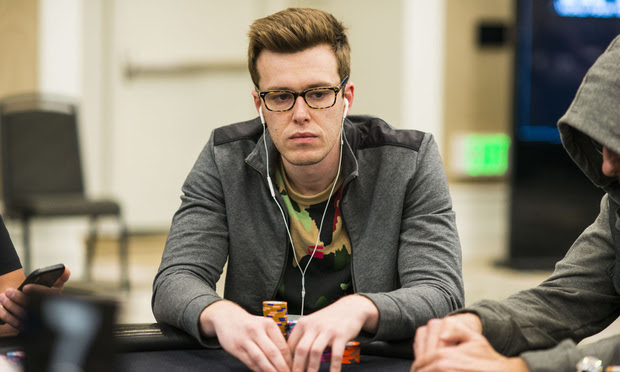Skilled in the Art: Poker Star All In on Lanham Claim | Plus, What the End of BRI Means
The legal feud started after PokerStars raised concerns Gordan Vayo was not in Canada when he won an online tournament.
May 09, 2018 at 07:30 AM
7 minute read
Welcome to Skilled in the Art. I'm Law.com IP reporter Scott Graham. We've got more PTAB news today and this time it has nothing to do with the Supreme Court's SAS Institute decision (well, almost nothing). But before we get to that, ante up for a round of IP poker. And always, email me your thoughts and feedback and follow me on Twitter.
➤ Want to receive Skilled in the Art as an email? Sign up here.
 Gordon Vayo. Photo: Joe Giron/WPT
Gordon Vayo. Photo: Joe Giron/WPT
It's All Good, Until You Win
For most of us, “Black Friday” conjures up holiday season shopping mall nightmares, or perhaps 1970s Steely Dan nightmares. For poker players, Black Friday refers to a very specific date: April 15, 2011, the day the Justice Department indicted executives of PokerStars, Full Tilt Poker and others for running unlawful internet gambling schemes. That caused the disappearance of online poker from most of the U.S. But PokerStars.com ultimately adapted by letting people use the site so long as they weren't doing so from within the United States.
Los Angeles' Gordon Vayo says he followed that rule by obtaining part-time residence in Canada in 2013 and getting cleared by PokerStars to play from there. It went smoothly until Vayo won a major event at PokerStars' Spring Championship of Online Poker tournament, known as SCOOP. When Vayo tried to cash out his $692,460 in winnings, PokerStars froze his account and launched what Vayo's attorney calls a “nearly year-long inquest” into whether he really played the tournament from his Ottawa digs.
Why am I telling you about this in a newsletter about IP? Because in addition to fraud, breach of contract and unfair competition, Vayo is bringing Lanham Act and publicity right claims against PokerStars.
And because Vayo's attorney, Gregory Fayer of Fayer Gipson, spins an entertaining complaint.
“Defendant advertises the SCOOP tournament to tournament participants as having $65 million in 'guaranteed prize money' in 2018 and a similar amount in 2017,” Fayer writes in Vayo v. Rational Entertainment Enterprises Limited, filed May 2. “However, defendant does not pay out the full amount of the 'guaranteed prize money,' including amounts owed to plaintiff.”
Notwithstanding its refusal to pay him, “defendant continues to tout Mr. Gordon as the winner of the SCOOP tournament on the PokerStars.com site, and continue[s] to profit off of its use of Mr. Gordon's name, which is held in high regard in the poker community,” Fayer adds.
The complaint doesn't explicitly say that Vayo remained in Canada throughout the SCOOP tournament. It says he “provided evidence” to PokerStars that he did. PokerStars then demanded Vayo prove it was “inconceivable” he might have been in the U.S. during the three-day event—a “ginned up” standard that creates “a pretext to deny payment … with impunity,” Fayer writes.
PokerStars was represented by Quinn Emanuel Urquhart & Sullivan during the investigation. “It's not appropriate for us to comment on pending litigation,” said a spokeswoman for The Stars Group, which owns PokerStars.
PTAB Ready to Bid Adieu to BRI
The Andrei Iancu era began in earnest today at the U.S. Patent and Trademark Office. After signaling for months that changes are in the offing, the PTO took its first concrete step toward sanding some rough edges off IPRs for patent owners. Specifically, the PTO proposed to drop the broadest reasonable interpretation (BRI) claim construction standard and replace it in America Invents Act proceedings with the Phillips standard used in district court. The PTO also proposes to “consider” any prior claim construction from district court or ITC proceedings.
Remember, the PTO under Michelle Lee went all the way to the Supreme Court just two years ago to defend BRI in Cuozzo v. Lee. The PTO argued then that BRI was consistent with how it handles examination proceedings. But Iancu has emphasized the importance—and potential efficiency—of having the PTAB and district courts on the same page.
Ben Pleune, the co-lead partner of Alston & Bird's PTAB practice, expects the Phillips standard to lead to fewer institutions, “which ultimately may mean that fewer patents are invalidated at the PTAB.”
While PTAB constructions won't be preclusive in district court proceedings, they might carry more weight there—or before the ITC for that matter. “Now that there's basically the same standard across all of them, they're going to be hard pressed not to take note,” Pleune said.
Haynes and Boone partner Andy Ehmke, whose firm typically represents petitioners before the PTAB, said he doesn't expect a big impact on institutions, because many petitioners have been anticipating the end of BRI and framing their petitions accordingly. But he said the new rule, assuming it's adopted, will prevent litigants from taking inconsistent positions on claim construction in different forums. “It's important in that it clearly shows the patent office is trying to head toward more consistency,” Ehmke said.
Ehmke said it remains to be seen how much weight individual district judges will afford PTAB constructions, even using the same standards. “To date, there's not been a lot of deference,” he said, but district judges could always chalk it up to the BRI standard. Ultimately, the PTAB, district courts and Federal Circuit will have to figure out how much deference is owed among the various bodies, Ehmke said.
Fish & Richardson partner Karl Renner said the timing of claim construction—in district court and the PTAB—now takes on added significance. And the new rule will shift importance back to the patent owner's preliminary response at the PTAB, says Renner, the co-chair of Fish's post-grant group.
Following the Supreme Court's SAS decision, it looked as if pouring resources into the preliminary response didn't make much sense any more because PTAB institution decisions are now all or nothing. But, says Renner, the preliminary claim construction the PTAB adopts at institution often ends up carrying the day in its final written decision. “You're not behooved to wait and fight about it later,” says Renner. With PTAB claim constructions now potentially carrying more weight in district court, that “makes it all the more important.”
Who Got the Work?
Dueling dog-walking apps are the subject of patent, trademark and breach-of-contract claims in U.S. District Judge Manuel Real's Los Angeles courtroom. Chicago-based Pet Check Technology LLC is laying claim to a smartphone-based system by which pet care providers assure owners that they've arrived at the appointed time and walked Rover along the agreed-to route. Co-defendants Handlr Inc. and DogZenergy began as a mother-daughter tandem, with Handlr since expanding more broadly into business management software.
➤The dispute: Brittany Alwerud and her mother, Karen, have been walking dogs in the La Jolla area of San Diego for more than 10 years, employing as many as a dozen full- or part-time dog walkers. Brittany Alwerud signed up in 2012 to license Pet Check's mobile app, which uses bar-code and GPS technology to schedule and verify dog-walking appointments and facilitate payments. By 2015 Alwerud had terminated her account and incorporated Handlr, which now markets a similar app not only for dog walkers but also tutors, fitness trainers, chefs, pool cleaners and other service providers. Handlr denies “any wrongful conduct,” saying there are no protectable trade secrets and that Handlr doesn't use bar codes or other technology patented by Pet Check.
➤The attorneys: Partner Gregory Leighton and associate Tanvi Patel of Chicago's Neal, Gerber & Eisenberg represent Pet Check, with Mitchell Silberberg & Knupp IP lit co-chair Karin Pagnanelli recently added to the team. Joseph Brown of the Law Offices of Joseph R. Brown represents Handlr, DogZenergy and Alwerud.
That's all for now. See you all Friday. In the meantime I'm going to see if I can dream up an app that will write future IP briefings.
This content has been archived. It is available through our partners, LexisNexis® and Bloomberg Law.
To view this content, please continue to their sites.
Not a Lexis Subscriber?
Subscribe Now
Not a Bloomberg Law Subscriber?
Subscribe Now
NOT FOR REPRINT
© 2025 ALM Global, LLC, All Rights Reserved. Request academic re-use from www.copyright.com. All other uses, submit a request to [email protected]. For more information visit Asset & Logo Licensing.
You Might Like
View All

Trump Administration Faces Legal Challenge Over EO Impacting Federal Workers
3 minute read
Elon Musk’s Tesla Pay Case Stokes Chatter Between Lawyers and Clients
7 minute readTrending Stories
- 1K&L Gates Files String of Suits Against Electronics Manufacturer's Competitors, Brightness Misrepresentations
- 2'Better of the Split': District Judge Weighs Circuit Divide in Considering Who Pays Decades-Old Medical Bill
- 3Which Georgia Courts Are Closed Today?—Here's a List
- 4After DEI Rollbacks, Employment Lawyers See Potential For Targeting Corporate Commitment to Equality
- 5People in the News—Jan. 23, 2025—Marshall Dennehey, Duane Morris, Hangley Aronchick
Who Got The Work
J. Brugh Lower of Gibbons has entered an appearance for industrial equipment supplier Devco Corporation in a pending trademark infringement lawsuit. The suit, accusing the defendant of selling knock-off Graco products, was filed Dec. 18 in New Jersey District Court by Rivkin Radler on behalf of Graco Inc. and Graco Minnesota. The case, assigned to U.S. District Judge Zahid N. Quraishi, is 3:24-cv-11294, Graco Inc. et al v. Devco Corporation.
Who Got The Work
Rebecca Maller-Stein and Kent A. Yalowitz of Arnold & Porter Kaye Scholer have entered their appearances for Hanaco Venture Capital and its executives, Lior Prosor and David Frankel, in a pending securities lawsuit. The action, filed on Dec. 24 in New York Southern District Court by Zell, Aron & Co. on behalf of Goldeneye Advisors, accuses the defendants of negligently and fraudulently managing the plaintiff's $1 million investment. The case, assigned to U.S. District Judge Vernon S. Broderick, is 1:24-cv-09918, Goldeneye Advisors, LLC v. Hanaco Venture Capital, Ltd. et al.
Who Got The Work
Attorneys from A&O Shearman has stepped in as defense counsel for Toronto-Dominion Bank and other defendants in a pending securities class action. The suit, filed Dec. 11 in New York Southern District Court by Bleichmar Fonti & Auld, accuses the defendants of concealing the bank's 'pervasive' deficiencies in regards to its compliance with the Bank Secrecy Act and the quality of its anti-money laundering controls. The case, assigned to U.S. District Judge Arun Subramanian, is 1:24-cv-09445, Gonzalez v. The Toronto-Dominion Bank et al.
Who Got The Work
Crown Castle International, a Pennsylvania company providing shared communications infrastructure, has turned to Luke D. Wolf of Gordon Rees Scully Mansukhani to fend off a pending breach-of-contract lawsuit. The court action, filed Nov. 25 in Michigan Eastern District Court by Hooper Hathaway PC on behalf of The Town Residences LLC, accuses Crown Castle of failing to transfer approximately $30,000 in utility payments from T-Mobile in breach of a roof-top lease and assignment agreement. The case, assigned to U.S. District Judge Susan K. Declercq, is 2:24-cv-13131, The Town Residences LLC v. T-Mobile US, Inc. et al.
Who Got The Work
Wilfred P. Coronato and Daniel M. Schwartz of McCarter & English have stepped in as defense counsel to Electrolux Home Products Inc. in a pending product liability lawsuit. The court action, filed Nov. 26 in New York Eastern District Court by Poulos Lopiccolo PC and Nagel Rice LLP on behalf of David Stern, alleges that the defendant's refrigerators’ drawers and shelving repeatedly break and fall apart within months after purchase. The case, assigned to U.S. District Judge Joan M. Azrack, is 2:24-cv-08204, Stern v. Electrolux Home Products, Inc.
Featured Firms
Law Offices of Gary Martin Hays & Associates, P.C.
(470) 294-1674
Law Offices of Mark E. Salomone
(857) 444-6468
Smith & Hassler
(713) 739-1250










